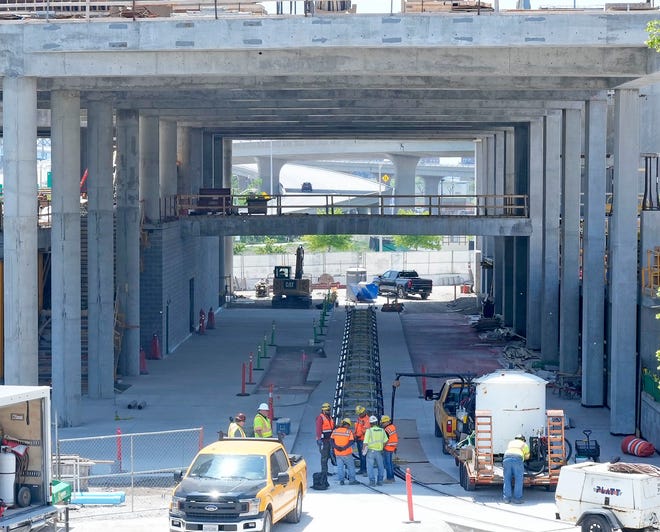
Milwaukee leaders are seeking ways to expand the streetcar despite new restrictions in the sweeping local government funding law.
Milwaukee’s streetcar, known as The Hop, launched in 2018 on a 2.1-mile route that runs in a loop through eastern downtown to the edge of the Historic Third Ward. It was one of the signature projects of former Democratic Mayor Tom Barrett, who said at its first day in service that expansion was already being studied.
It is also a project that has long drawn the ire of Republican state legislators, who view it as wasteful and “frivolous,” in the words of Assembly Speaker Robin Vos.
Now, the sweeping local government funding law passed by the Republican-controlled state Legislature and signed by Democratic Gov. Tony Evers makes expansion all the more difficult by significantly narrowing the streetcar’s potential funding sources.
The streetcar’s primary Common Council proponent is nonetheless trying to find ways to move expansions forward.
“It may not be next month or next year, but within the two- to five-year timeframe we’re looking to implement the full extent of these extensions, I have an expectation circumstance will change,” Ald. Robert Bauman told the Journal Sentinel days after he introduced legislation pursuing additional routes.
More:The Milwaukee sales tax bill comes with big strings attached. Here are 5 changes coming to the city.
More:Sales tax could help Milwaukee but new state law also comes with steep costs. Here’s how.
What does the law say about the streetcar?
The new state law prevents the city from using tax incremental financing districts not only for direct or indirect expenses related to operating the streetcar but, now, also to fund its development and construction.
There is an exception for costs for the 0.4-mile lakefront line tied to the Couture apartment high-rise construction.
Tax incremental financing districts defer adding the value of new developments to the property tax base until project funding is paid. The maximum life of tax incremental financing districts is between 20 and 27 years, according to state law.
The new law also prevents the city from using tax money to develop, operate or maintain the streetcar.
Why does losing these funding sources matter?
Federal grants and tax incremental financing were used to fund the initial construction of the streetcar line.
Tax incremental financing was expected to again play a pivotal role in future expansions.
“That is the easiest and the most logical, and frankly appropriate, financing tool because you’re basically working off the incremental value that the very investment you’re pursuing will generate,” said Bauman, whose district includes much of downtown.
A 2019 proposal by Barrett to use $46.8 million in tax incremental financing for construction and preliminary engineering stalled before the pandemic.
That plan would have used the funding source for construction of an extension to West Wisconsin Avenue ahead of the planned 2020 Democratic National Convention and for preliminary engineering of extensions linking Bronzeville to the north of downtown and Walker’s Point to the south. They stalled after council members raised concerns that residents near the extension could be pushed out, and that the extensions didn’t go deep enough into predominantly African-American and Latino communities.
To date, the operation of the streetcar has been funded by federal grants, sponsorships and the city’s transportation fund, according to the city’s Budget Office.
Why does expanding the streetcar matter?
Proponents argue it is an economic development tool that was always meant to be expanded to reach its full value to the city.
“Since the Milwaukee Streetcar was approved in 2015, there has been over $1.7 billion in new development along or in close proximity to the Streetcar’s two initial routes, including 2.7 million square feet in new or renovated commercial space, over 1,000 apartment units and more than 360 hotel rooms that are recently completed, under construction or expected to start soon,” the legislation Bauman put forward states.
It is among the measures recommended in Milwaukee’s new downtown comprehensive plan that was recently proposed by the Department of City Development.
“The Milwaukee Streetcar has increased mobility for Milwaukee residents and visitors, improved access to Downtown Milwaukee attractions and destinations, and reduced the need for off-street parking by allowing “park-once” visits to Downtown Milwaukee,” the legislation states. “Construction, operation and maintenance of the Milwaukee Streetcar have created much-needed employment opportunities for Milwaukee residents.”
What would the city’s streetcar legislation do?
The city resolution on which Bauman was the lead sponsor directs the city’s Department of Public Works to apply for a Federal Transit Administration grant to extend the streetcar to Fiserv Forum and to the area where Brady Street intersects with Farwell and Prospect avenues on the city’s east side.
The legislation states that those extensions “have already undergone extensive analysis and are shovel-ready projects.”
It also directs the department to begin project development for extensions to Bronzeville and Walker’s Point, which the legislation calls “catalytic projects.”
“The official policy of the City of Milwaukee is to develop an expanded streetcar system, which eventually extends to King Drive and North Avenue in Bronzeville and Walker’s Point,” Bauman recently told the council’s Steering and Rules Committee.
And, the Department of Public Works must provide an update on its progress to the Common Council within three months.
When will the Common Council vote on this legislation?
The resolution was recommended for adoption by the Steering and Rules Committee on a 6-2 vote on June 26.
The council is expected to take up the streetcar vote at its July 11 meeting, along with other legislation opposing or seeking workarounds to new state restrictions in the law.

